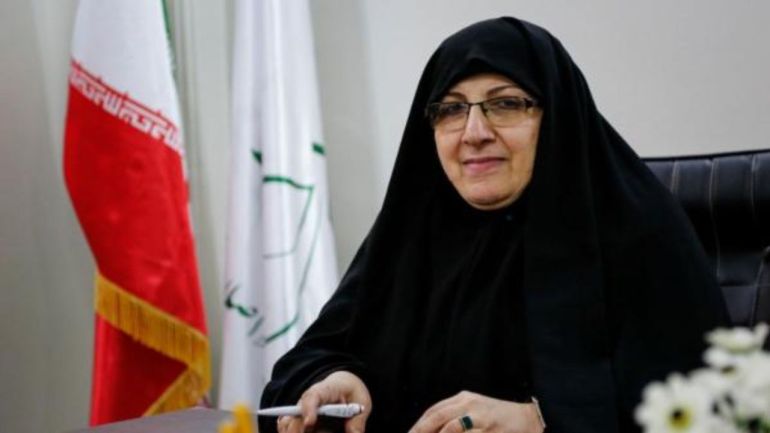With the date of the 13th round of the Iranian presidential elections approaching tomorrow, June 18, and after the debates of the presidential candidates and their various promises to Iranian women, the question arises about the right of Iranian women to run for the presidency.
Zahra Shujaeel's candidacy for the presidential elections this year has not been approved (communication sites)
According to the figures, and according to the head of the electoral campaign (committee) in Iran, Jamal Aref, 592 candidates registered for the Iranian presidential elections, including 40 women, the most famous of whom is Zahra Shojaei, Secretary-General of the Reform Women's Association and Head of the Center for Women's Participation in Muhammad Khatami's government.
Al Jazeera Net met with Dr. Zahra Shojaei, and Dr. Barwaneh Salhshouri, the deputy and head of the Parliament's Women's Committee in the previous session, to talk about the possibility of Iranian women running for the presidency, as well as the most important demands and concerns of Iranian women.
Zahra Shujaei believes that the word men means personality and the word man means male (communication sites)
Controversy over the word "men"
According to Article 115 of the Iranian Constitution, which talks about the conditions for running for the presidency, the constitution stipulates that the president must be a “men of sectarianism and politics.” This text led to a debate about the interpretation of the word men years ago.
Zahra Shojaei says that after the victory of the Islamic Revolution and during the preparation of the constitution in 1979, the constitution was submitted to the Assembly of Constitutional Experts for ratification. At that time, Munira Gharji, the only woman in the assembly, objected to the condition of the presidency that the president be a man. The council members agreed to her objection, and upon the suggestion of Muhammad Beheshti I wrote the word "men" instead of the word "man", because the word "men" means character and the word "man" means male.
Iranian women's society seeks to achieve the goal of 30% to participate in senior management positions in the country (Al-Jazeera)
Although in the past some officials and members of the Guardian Council believed that the word “men” meant males, some women, such as the late Azam Taleghani, nonetheless registered in the previous presidential elections to demand a correct interpretation of this phrase by the Guardian Council.
In her interview with Al Jazeera Net, Shojaei stated that she registered this time for the presidential elections with the proposal and support of the Iranian Reform Front and the coalition of reformist women's parties, and added, "The Guardian Council reviewed my case, and despite the refusal of my eligibility to run, this refusal was not based on my gender."
Iranian women are trying to participate in elections and in power (Al-Jazeera)
The spokesman for the Guardian Council, Abbas Ali Kadakhdayi, stated before the registration of presidential candidates that the council did not prevent the registration of women, and that women's eligibility to run for candidacy is reviewed like other men.
Various concerns and demands
Barwana Salhshouri believes that because women belong to different social and economic groups, their demands are not shaped in the same way.
"We have women whose main demand is to improve their economic situation and livelihood like the women who provide for their families, and on the other hand we have young women whose main concern may be the issue of hijab and going to the gym."
Barwana Salhshouri believes that women's demands differ according to their social and economic classes (communication sites)
"It seems that the laws of discrimination that we apply in the field of family and women are the most in need of change than others. For example, according to our laws, a woman needs her husband's permission to leave the house, study, work and leave the country, even if she is a university professor or international sports," Salhshouri added.
Salhshouri pointed out that there are also unwritten laws that prevent women from social participation.
“We don’t have a written law about women not going to stadiums or cycling and motorcycling or performing a concert, agreeing to women’s eligibility and so on, but these things are forbidden. It may not seem like important things, but when a person feels deprived and humiliated, he feels frustration and social differences.
Facilitating women's work, equal wages, more social freedoms and equal rights are demands for Iranian women (Al-Jazeera)
The share of women in government positions
The percentage of women's participation in government positions and senior management in the country is increasing compared to the beginning of the Islamic Revolution.
Iranian women's groupings are seeking to achieve 30% participation in the country's top management positions.
The number of female deputies in the legislative authority (Parliament) increased by 6% from 4 women since the revolution to 17 women, and this percentage in the executive authority may reach approximately 25%.
Many female activists believe that the problems of women in Iranian society are gradually diminishing (Al-Jazeera)
Many activists believe that women's problems in Iranian society are gradually diminishing, because the generalization and expansion of women's demands in society has been influential, and this is why we see presidential candidates referring in their discussions to the employment of women in government positions, and addressing women's issues such as the compulsory veil and guidance patrols (the morality police), This is one of the things that could not be discussed in the past.
In addition to the above, facilitating women’s work, demanding equal wages, more social freedoms, equal rights and benefits, as well as changing the patriarchal view of women and girls, as well as facilitating marriage, are among the demands of women and girls in Iran.

